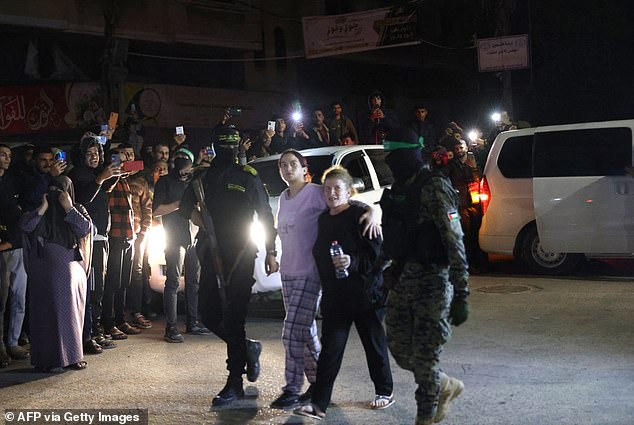Israel prepares for horror scenario that raped hostages held by Hamas may return home pregnant with a terrorist’s child
Israel is preparing for the horrific scenario that raped hostages held by Hamas could return home pregnant.
Hospitals in Israel are discussing how to possibly deal with the mental and physical condition of some female hostages who may be in various stages of pregnancy when they are released from captivity, the Hebrew publication said Maariv.
Gynecological teams are also concerned about the current health of women who may be pregnant, as the poor sanitary conditions in which they are held captive in Gaza could put them at risk of serious infections.
Israel’s Ministry of Health allows women to request an abortion up until the moment of birth, depending on their age and other circumstances, even if the pregnancy is the result of rape.
About 136 hostages are believed to still be held captive by Hamas in Gaza and it is believed that some may have been raped, according to the testimonies of those already released.
Israel is preparing for the horrific scenario that raped hostages held by Hamas could return home pregnant. In the photo: Israeli Prime Minister Benjamin Netanyahu

Hamas fighters escort newly released hostages before handing them over to the Red Cross in Rafah, southern Gaza Strip, on November 28, 2023

A man attaches one of many photos of Israelis still held hostage in Gaza to a wall in Jerusalem on January 10
Professor Tal Biron-Shental, chairman of obstetrics and gynecology at the Meir Medical Center in Kfar Saba, told Maariv: ‘The human mind fails to understand a case of abduction in captivity, which will not only be related to the pregnancy , but also with the fact that it was created by the brutal rape of a murderous terrorist.
‘The greatest difficulty the country must now prepare for is the terrible mental trauma. A pregnant woman who feels movements becomes attached to the fetus.
“But in the case where it is the product of a terrorist who murdered her relatives and brutally raped her, the emotional outcome is unimaginable.
‘I’m not sure how they will deal with it, but we must now prepare for the terrible theoretical possibility of a woman fathering or raising such a child.
“So we must stop these atrocities, not allow the prisoners there to die, bring them back and provide them with care.”
Professor Hagai Levine, President of the Israeli Association of Public Health Physicians and Head of the Medical Department at Captive Families Headquarters added: ‘The task of terminating an advanced pregnancy becomes increasingly complex and challenging as the days in captivity progress.
‘Stress, polluted environments and the lack of medical supervision compound the complications and dangers of pregnancy for the mother, not to mention the horrific psychological aspect.
‘We have been pressing for a long time with requests to allow medical examinations and the transfer of medicines. If there is a captured woman who, God forbid, has become pregnant through rape, it is imperative to rush her home.”

Eylon Keshet holds posters of his imprisoned relatives as he views an exhibition aimed at highlighting the ongoing plight of Israeli hostages in Gaza

People hold posters depicting Israeli hostages in Gaza, marking 100 days since the October 7 Hamas attack to January 14

Israeli Prime Minister Benjamin Netanyahu speaks during the weekly cabinet meeting at the Defense Ministry in Tel Aviv, Israel, on January 7

Smoke rises after Israeli airstrikes in Khan Yunis, southern Gaza Strip, on January 16
January 14 marked 100 days since Hamas invaded southern Israel, storming across the border at dawn in cars, vans and by motorized paraglider.
About 1,100 Israelis, mostly civilians, were killed October 7 attacks, while 240 people were taken hostage to be used as leverage for the prisoner swap with Israel, which holds many Palestinians – civilians and suspected terrorists – in prisons.
The Israeli offensive in response to the attack has cost more than 1,000 lives 23,000 Palestinians. the Palestinian Ministry of Health said. Children make up approximately 40 percent of Gaza’s population.
A weeklong ceasefire was organized in November after weeks of retaliatory bombing by Israel on communities in Gaza, as the army cleared the way for a wider ground invasion.
Critics, including international charities and the UN, warned that the bombings devastated civilian communities in one of the most densely packed enclaves in the world.
A siege of Gaza City, cutting off water, aid, power, medical supplies and fuel to the besieged Strip, risked a serious humanitarian crisis, the UN warned in October.
And 24-hour evacuation orders were met with outrage from humanitarian aid groups, warning that such an unprecedented migration of people was “impossible.”
Mounting pressure eventually led Israel to agree to a temporary ceasefire that would last from November 24 to 30.
A total of 110 hostages were released during that period, mainly as part of a Qatar-brokered deal between Hamas and Israel, some released as part of a separate deal with Thailand and two as a gesture to Russian President Vladimir Putin.
The return of hostages from Gaza has revealed the appalling conditions hostages in Gaza were subjected to.
Some told horrifying accounts of rape, physical abuse and psychological torture, prompting horrifying reactions from relatives and Israeli citizens who increased pressure on the government to ensure the safe return of the remaining prisoners.
